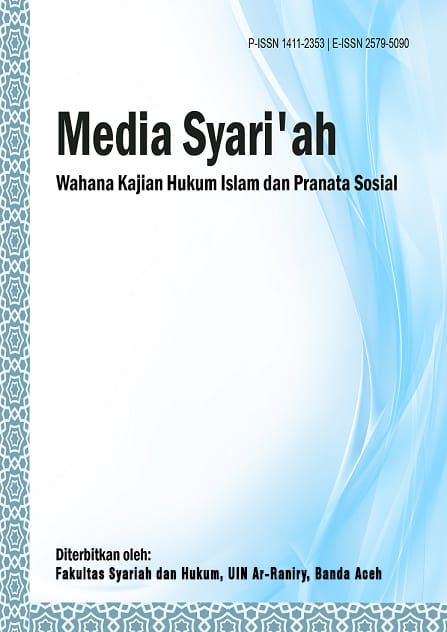Sistem Pewarisan Masyarakat Adat di Lingkungan Etnik Gayo
DOI:
https://doi.org/10.22373/jms.v22i1.3666Keywords:
Sistim Kewarisan, Masyarakat Adat, Etnik GayoAbstract
Abstrak: Artikel ini bertujuan mengemukakan sistim kewarisan apa yang lebih dominan diterapkan oleh etnik Gayo? Penelitian ini bersifat deskriptif analitis yaitu dengan jalan mendiskripsikan sejumlah variabel yang berkaitan dengan masalah dan unit yang diteliti dengan menggunakan pendekatan sosio-antropologis, yaitu pendekatan terhadap suatu masalah dengan cara melihat kenyataan-kenyataan yang terjadi dalam masyarakat. Dalam hal ini jenis sampel yang digunakan adalah purposive sampling dan sampel probabilitas secara random. Kesimpulan dari penelitian ini menunjukkan bahwa kecenderungan masyarakat Gayo dalam penyelesaian warisan lebih memilih melalui hukum waris adat. Dengan kata lain persepsi masyarakat Gayo terhadap sistim hukum waris adat Gayo begitu diperioritaskan. Dari jawaban responden yang lebih melaksanakan hukum waris secara adat mencapai proporsi 63.30% dari keseluruhan sampel. Selain itu masih mengakarnya adat yang menjadi pengamalan hidup pada masyarakat Gayo. Dari jawaban responden sekitar 40.82% menyatakan hukum adat sudah berakar secara turun temurun, kemudian 30.42% menjawab untuk menghormati dan melestarikan hukum adat dan 15% menjawab takut mendapat kutukan dari sanksi adat bila hukum adat tidak dilaksanakan.
Abstract: This research study aims to show which inheritance system is more dominantly applied by the Gayo ethnic group? This research is analytical descriptive, namely by describing several variables related to the problem and the unit under study using the socio-anthropological approach, which is the approach to a problem by looking at the facts that occur in society. In this case, the type of sample used is purposive sampling and random probability samples. The conclusion from this study shows that the tendency of the Gayo people to settle their inheritance prefers it through customary inheritance law. In other words, the perception of the Gayo community on the customary inheritance system of Gayo is prioritized. From the answers of respondents who carry out customary inheritance law, it reaches 63.30% proportion of the whole sample. Also, it is still rooted in adat which is a living practice for the Gayo people. From the respondents' answers, around 40.82% stated that customary law had been rooted for generations, then 30.42% responded to respecting and preserving customary law and 15% said they were afraid of being banned by adat sanctions if customary law was not implemented.
References
B. Ter Haar Bzn. (1958). Asas-Asas dan Susunan Hukum Adat. Pradnua Paramita.
C. Snouck Hurgronje. (1996). Het Gayo Land and Lijne Beworners (Gayo: Masyarakat dan Kebudayaan). Balai Pustaka.
Djapri Basri. (1988). Pola Prilaku Golongan Sub Etnik Gayo dan Mitos Asal Mula Mereka. Pustaka Grafika Kita.
Hilman Hadikusuma. (1990). Hukum Waris Adat. Cipta Aditya Bhakti.
Hilman Hadikusuma. (1999). Hukum Waris Adat. Citra Aditya Bakti.
Litbang Kompas. (2017). Otonomi Kabupaten Aceh Tengah.
Pagar. (1995). Himpunan Peraturan Perundang-Undangan Peradilan Agama di Indonesia. IAIN Press.
S.A. Hakim. (1967). Hukum Adat (Perorangan, Perkawinan, dan pewarisan). Stensilan.
Sanafiah Faisal. (1992). Format Penelitian Sosial. Rajawali Pers.
Soepomo. (1979). Bab-Bab Tentang Hukum Adat. Pradnya Paramita.
Soerjono Soekanto. (1995). Penelitian Hukum Normatif Suatu Tinjauan Singkat. Raja Grafindo Persada.
Statistik Kabupaten Aceh Tengah. (2017). Statistik Kabupaten Aceh Tengah Tahun 2017.
Downloads
Published
Issue
Section
License
MEDIA SYARI'AH: Wahana Kajian Hukum Islam dan Pranata Sosial has CC-BY-SA or an equivalent license as the optimal license for the publication, distribution, use, and reuse of scholarly work. Authors who publish with this journal agree to the following terms:
1. Authors retain copyright and grant the journal right of first publication with the work simultaneously licensed under a Creative Commons Attribution-ShareAlike 4.0 International License that allows others to share the work with an acknowledgment of the work's authorship and initial publication in this journal.
2. Authors are able to enter into separate, additional contractual arrangements for the non-exclusive distribution of the journal's published version of the work (e.g., post it to an institutional repository or publish it in a book), with an acknowledgment of its initial publication in this journal.
3. Authors are permitted and encouraged to post their work online (e.g., in institutional repositories or on their website) prior to and during the submission process, as it can lead to productive exchanges, as well as earlier and greater citation of published work (See The Effect of Open Access).
You are free to:
Share — copy and redistribute the material in any medium or format.
Adapt — remix, transform, and build upon the material for any purpose, even commercially.
The licensor cannot revoke these freedoms as long as you follow the license terms.
All papers published in MEDIA SYARI'AH: Wahana Kajian Hukum Islam dan Pranata Sosial are licensed under a Creative Commons Attribution-ShareAlike 4.0 International License.




.png)


.png)
.png)
.png)



